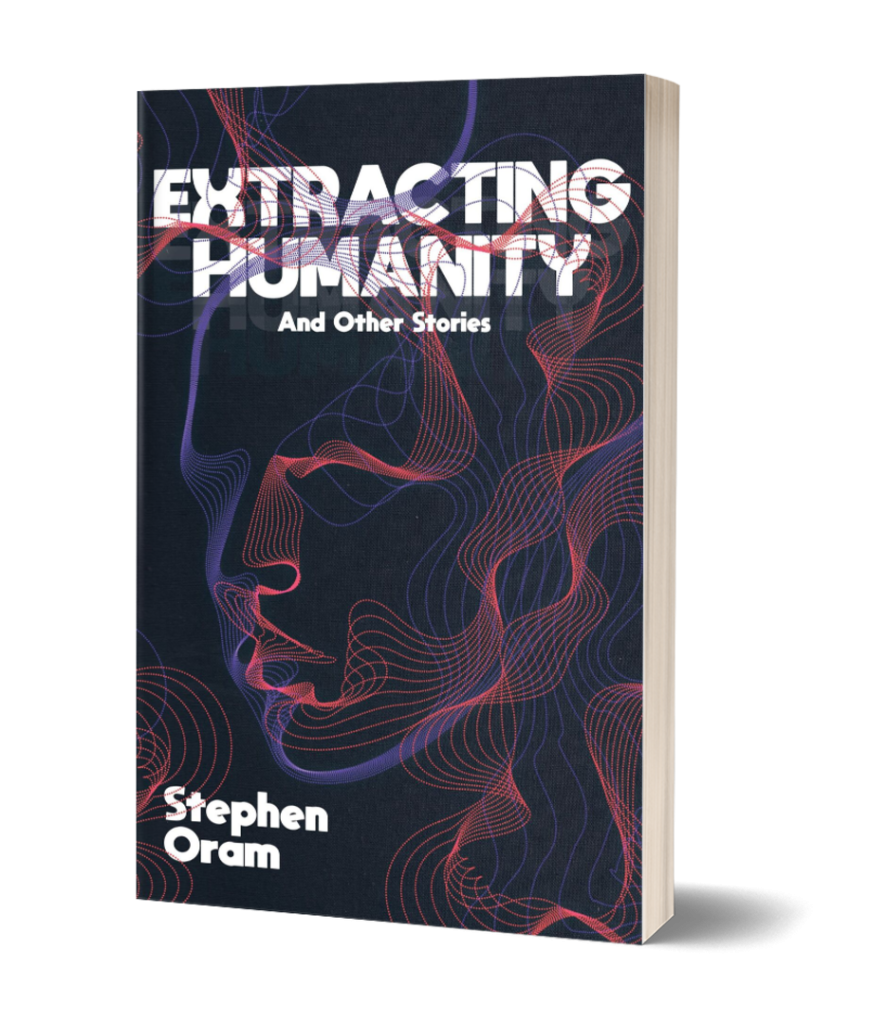

New: Extracting Humanity is a skilful exploration of smart currencies, memorials, medical care, treatment of refugees, social networks, data monitoring, and justice systems. Always without prescription or reprimand, these stories are simply the beginning of the conversation.
ABOUT
Stephen Oram writes near-future science fiction. He is published in several anthologies, including the Best of British Science Fiction 2020 and 2022, and has two published novels and three collections of sci-fi shorts.
He also works with artists, scientists and technologists on projects that explore possible future outcomes of their research through short stories.
He works closely with King’s College London and the digital think-tank, Cybersalon. He is a founding curator for near-future fiction at Virtual Futures, a writer for prototypers SciFutures and a member of the Clockhouse London Writers.
His work has been praised by publications as diverse as The Morning Star and The Financial Times.
WRITING
“Combines the sharp edginess of a JG Ballard with the vaulting inventiveness of a modernist Ovid.” Paul Simon, The Morning Star
“Should set the rest of us thinking about science and its possible repercussions.” Chris Nuttall, The Financial Times
“With Bradbury’s clear-sightedness and Pangborn’s wit, he pulls ways to live out from under modernity’s ‘cacophony of crap’.” Simon Ings, Arts Editor, New Scientist.
“A soothsayer for this century’s relationship with technology.” Chris Thornett, Editor Linux User & Developer Magazine.
PROJECTS WITH SCIENTISTS, TECHNOLOGISTS & ARTISTS
“If I would choose one thing that [participating in the project] may have affected, it was my willingness to disseminate our science and our results to the public; I’m more prone to that. I enjoy it more. But I also think it’s more important.” Scientist participant.
“Stephen Oram worked in a number of highly engaging ways to encourage residents to imagine future worlds with him. In particular his live reading at our [Furtherfield] Future Fair captivated audiences where he read a section of the story and then hosted a discussion with attendees. Oram’s work was the perfect fit and we look forward to collaborating again. ” Dr. Charlotte Frost, Executive Director, Furtherfield.
“There is a public out there hungry for forums where they can explore the complex shades of ethical grey surrounding science and innovation.” Dr Christine Aicardi, King’s College London.
SPEAKING
Among other things, he can speak on the art of writing near-future fiction or his work with experts to explore their research and innovation through science fiction.
He has given talks at ‘festivals of thought’, to corporate, academic and general public audiences. He has been on literary festival and future focused panels, and has read his work in public extensively.
Among these are: International Robotics Showcase (keynote); Royal Society for Arts (RSA); Barbican FutureFest Late; Goethe-Institut Indonesien; Finsbury Park Future Fair; Holition; King’s College London; Leverhulme Centre for the Future of Intelligence; Bradford Literary Festival; Bristol Literary Festival; Greenbelt Festival; UK science fiction convention (Eastercon), British Science Fiction Association; British Fantasy Society; Royal Anthropological Institute; Central Saint Martins’ London Laser Lab; and the Science Museum as part of the first Human Brain Project Innovation Forum.
Recent talks:
Applied Science Fiction: in the pursuit of consensual future(s)
Exploring future(s) with the public using near-future fiction.
Forging Futures: using fictional world-building to align technological innovation with societal aspiration.
Speculative fiction influences scientists in what they research and technologists in what they invent. It can also be a vehicle for science communication, enabling the general public to consider the ethical issues around how science and technology might be used to shape their future(s). He can discuss and demonstrate how speculative fiction can enable meaningful debate between scientists, technologists, writers, readers and the general public by drawing on his own experience with organisations such as, King’s College London, the Defence Science & Technology Lab, and the thinktank Cybersalon.
He is always open and interested in all types of speaking events.
